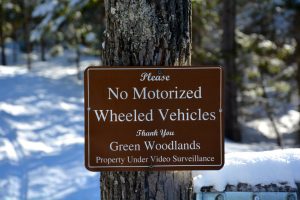Green Woodlands Case Study
In an effort to understand how Trescott could create better recreational usage behavior, we studied the Green Woodlands Property. Green Woodlands is a system of privately managed multipurpose conservation lands in Lyme, Orford, Dorchester, and Wentworth, New Hampshire. Activities on the property include wildlife management, recreational hunting and fishing, research and education, historical preservation, environmental research and education, sustainable “green” forestry, forest property preservation, mountain biking, cross country skiing, horseback riding and hiking. Usage of the land is free to the public.
The Lyme property attracts many local cross country skiers. Bob Green, one of the principal owners of Green Woodlands grooms trails and maintains warming houses.
This service is uncommon, as grooming is both labor intensive and costly. Although free, Bob Green expects that in exchange for usage of the trails, users adhere to a culture of stewardship and mutual respect. Users adhere to certain rules such as:
- No Motorized Wheeled Vehicles
- Remain Out of Private Areas
- No Biking During Mud Season
- Limit Groups to Under 6
- No Campfires or Camping
- Do Not Publish Maps or Advertise the Land
- SMILE
Trescott and Greens do not have all the same priorities, but they share many regulations that facilitate conservation. Respectful, limited usage allows the lands to provide educational and recreational opportunities. Recently, blatant disrespect of rules at Trescott has forced public access to be limited. Greens does not have these same issues.
A fundamental difference exists in the way users view Trescott and Greens which affects the way they interact with the properties. Users of Greens see land usage as a privilege made possible by the goodwill of Bob Green. People do not feel entitled because they understand the privilege can be rescinded. Furthermore, they believe that respectful usage in lieu of monetary payment is a fair price to pay for access. Users feel the exchange is personal. Furthermore, they feel as though they can be held accountable for their actions.
Like Greens, Trescott is privately owned land that is available to the public because of the time, money and commitment of a holding company. Yet there is a disconnect, in that users do not see the effort necessary to maintain the land. Because the land is partially owned by Hanover, people assume that their access to the land is a right.
It is a privilege made possible by the generosity of the management. It is a privilege, because recreation is not a priority of the lands. Most recreation has a negative impact on the conservation efforts. Yet, the management allows limited usage because they understand the importance of recreation access
People who do choose to break the rules do not understand the magnitude of their actions. They do not understand how sensitive the property is. Furthermore, they feel like they can get away with breaking rules, because no one is watching. Interaction with management is infrequent and impersonal. Because the land feels like an impersonal property of an administrative body.
One way to change the culture of Trescott is through signage. One of the primary way users interact with the land is through signage. Signage has the ability to change the way people interact with the land.
Many of the signs do not match, and feel like they have been placed by different entities. Many of the signs reminding users of the rules seem punitive and cold. Although both Greens and Trescott signage attempts to emphasize the “cans” of the property, Green’s signage is much more welcoming. Signage that is consistent and friendly commands polite respect.
Trescott has a limited budget, but UVTA and Trescott could work toward replacing signage in stages to be consistent and welcoming. Although the Upper Valley Trails Alliance would like users to be able to freely use the lands, the signage must remind that usage is a privilege that can be rescinded. This aligns with UVTA’s mission to inform the public about trail etiquette. When a culture of mutual respect between management and all users exists, UVTA’s relationship with Trescott will be better. Furthermore, when priorities like forestry and clean water can be achieved, and recreation can be maximized.
Click on photos to enlarge
(photos courtesy of Dowd’s Country Inn)



